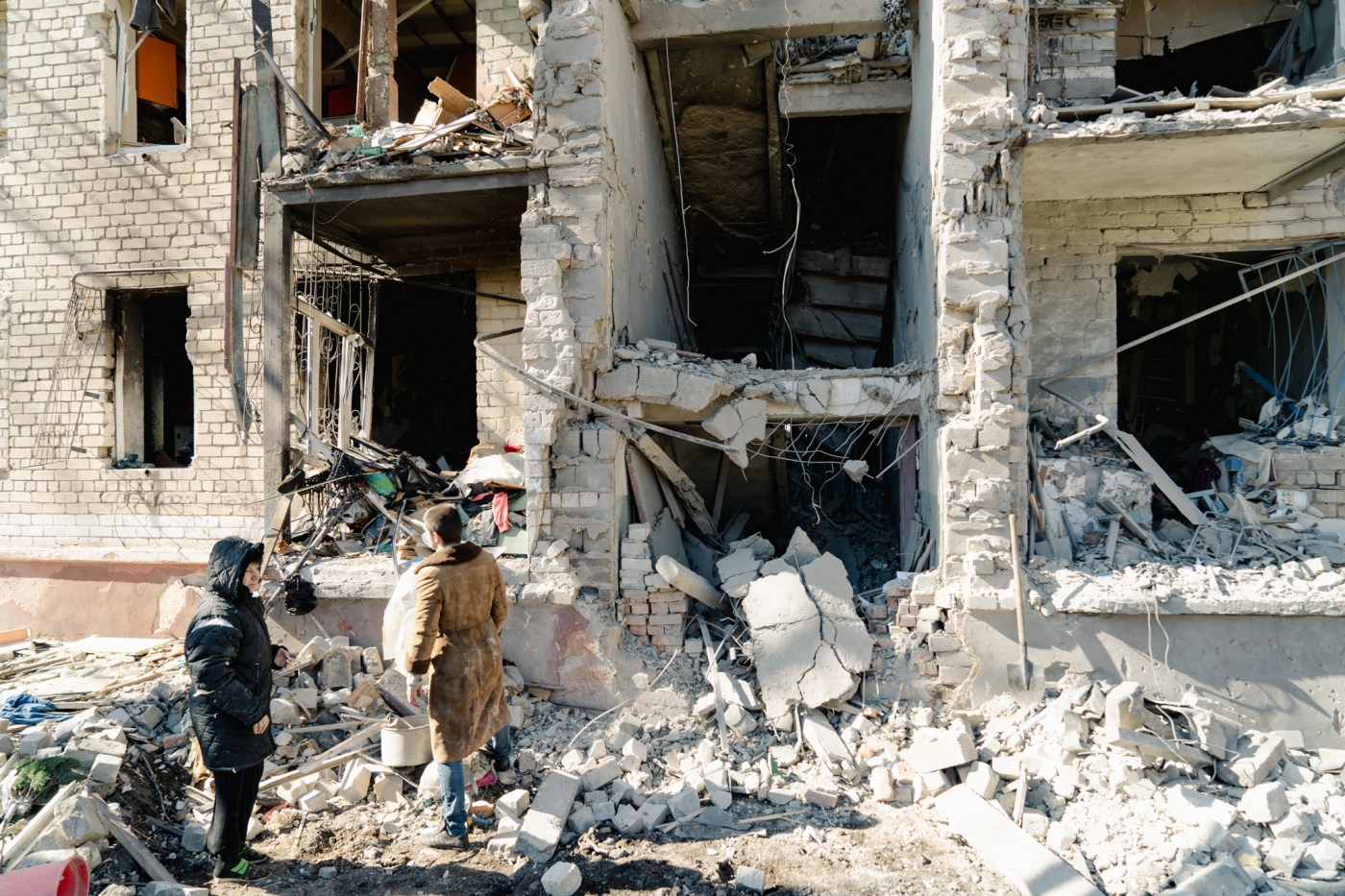KRAMATORSK, Ukraine—After yet another missile struck Kramatorsk’s city center on Tuesday morning, residents of a shattered apartment bloc went to work clearing the rubble. The attack, which killed one person and injured at least seven others, had completely blown a wall off one of the three-story building’s main stairwells, as well as its surrounding units. Elsewhere, the force of the explosion had shattered windows and ejected possessions onto the courtyard below.
“We are tired of this,” said Lyudmila, a pensioner who was staying at her daughter’s apartment in the building after her own home had been similarly hit. “It’s time to take pity on the wives, the children, the old people, the orphans.”
Amid this daily drama, many residents cling to whatever sense of normalcy they can. For Irina Artemova, that means caring for hundreds of tropical fish at her family-owned aquarium—less than a mile from the site of the recent missile strike.
Her immense collection, around half of which belongs to Ukrainians who have fled town, ranges from colorful sea fish to a tank full of piranhas. There is even an Amazonian stingray. (“It digs into the skin like a hook,” Artemova noted. “It is very dangerous for humans.”)
Artemova, who founded the Kramatorsk Amazing Fish Aquarium with her husband Ramon Dubinin in 2020, told The Dispatch that they have no plans to abandon the animals even as the frontline is only some 15 miles away. “Our establishment is a symbol of some kind of resilience because we didn't close down,” said Artemova. “As long as the city lives on, we live on.”
War first came to Kramatorsk in April 2014, when insurgents led by Russian spy veteran Igor Girkin briefly occupied the city. After Ukraine retook the area, Kramatorsk became the de-facto capital of all land in the Donetsk region that had not been occupied by Russian forces and their local proxies.
The relative peace enjoyed in Kramatorsk for eight years was shattered in the first few minutes of the full-scale invasion: Russia launched a barrage of missiles toward the city just as Russian President Vladimir Putin concluded his early morning speech announcing a “special military operation.”
Kramatorsk has since faced on-and-off bombardments. The worst attack was a ballistic missile strike in April against the city’s train station that left 60 civilians dead. More recently, a school was destroyed on the night of March 5. Ukrainian President Volodymyr Zelensky warned in a CNN interview last week that the Russians could “go to Kramatorsk” if Ukraine retreats from the nearby city of Bakhmut.
As Russian tanks began rolling across the border last year, Artemova and Dubinin realized that it would be logistically impossible to evacuate with the fish. While the war forced the couple to close the aquarium for business for a time, Artemova said they never considered leaving the fish to die.
The couple decided to stay behind and open their tanks for those looking for a safe haven for their pets. At their peak, they were taking up to three tanks a day. “We never thought that so many people keep fish at home,” said Artemova.
While an evacuation would have been a death sentence for the fish, life in a warzone is no picnic either. Russian attacks on Ukrainian energy infrastructure lead to regular blackouts, and the couple eventually acquired a powerful generator from Irish donors. With no paying customers, the couple is also dependent on donations to supply the fish with the necessary food and minerals.
After the strategic situation in Kramatorsk worsened in the spring, the family opted for Artemova and their 15-year-old daughter to leave the Donbas for the relative safety of western Ukraine. Dubinin was left on his own to take care of the fish amid an aggressive Russian offensive that threatened to overrun the region: “It was said that you could wake up one morning to find that they had encircled us,” recalled Dubinin.
But September’s Kharkiv counteroffensive crushed the Russian line to the north, leading to the family’s reunification in Kramatorsk. In December, with residents returning, they decided to open the aquarium to the public—free of charge.
“This is the only such institution of its kind, where you can bring your child to get a little distracted from bad thoughts,” said Artemova. She estimates the aquarium now gets three to five groups of visitors per day. Their most recent acquisition is a red-eared slider turtle rescued from a local park, apparently abandoned by its owner.
For Dubinin, a lifelong native of Kramatorsk, keeping the aquarium open is a matter of patriotic principle: “We are for the truth, we are for freedom, for the will of the Ukrainian people,” he said as an air raid siren rang outside.






Please note that we at The Dispatch hold ourselves, our work, and our commenters to a higher standard than other places on the internet. We welcome comments that foster genuine debate or discussion—including comments critical of us or our work—but responses that include ad hominem attacks on fellow Dispatch members or are intended to stoke fear and anger may be moderated.
With your membership, you only have the ability to comment on The Morning Dispatch articles. Consider upgrading to join the conversation everywhere.